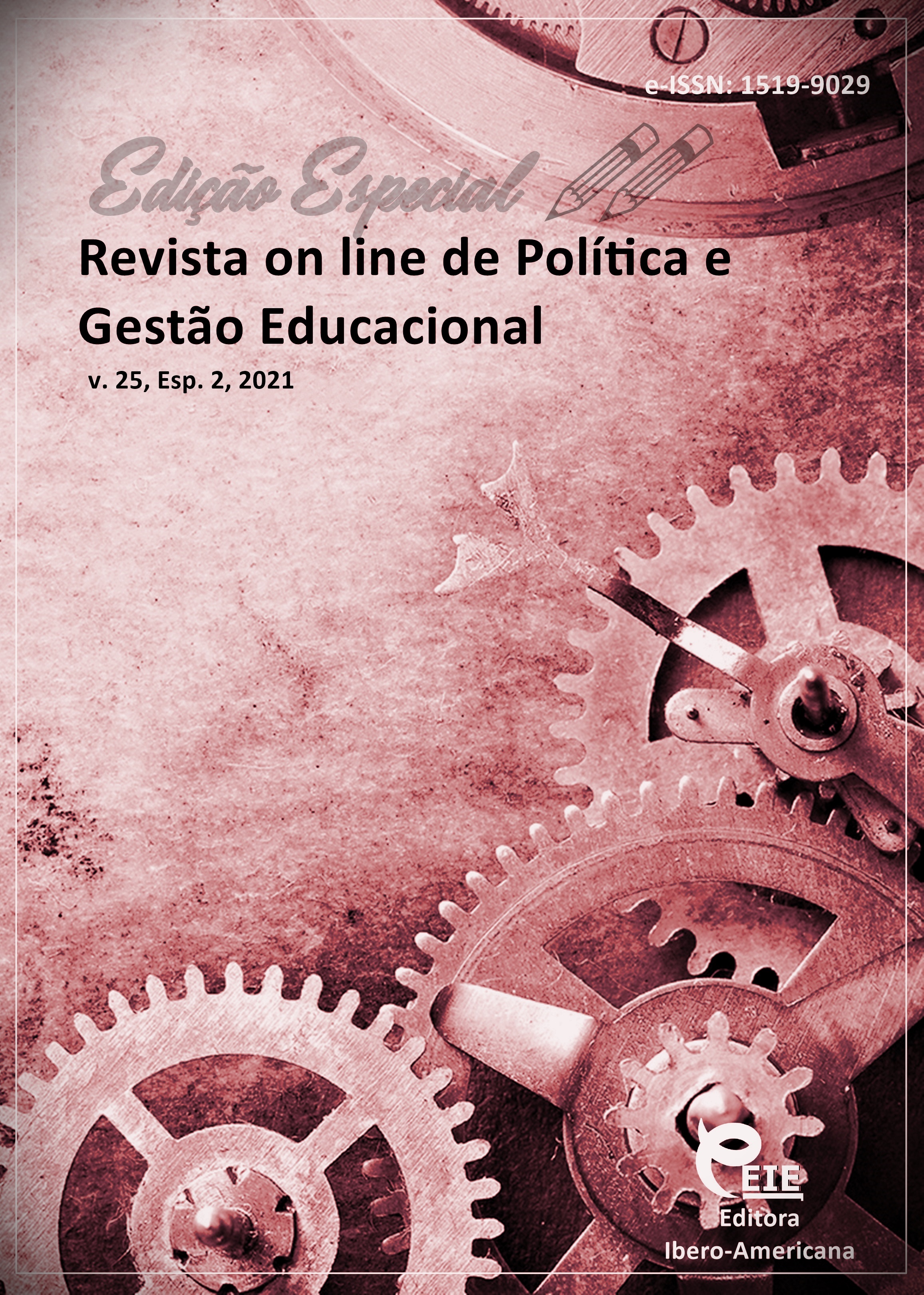Uma escola de mesquita na estrutura da educação religiosa muçulmana: estado e avaliação
DOI:
https://doi.org/10.22633/rpge.v25iesp.2.15276Palavras-chave:
Religião, Educação, Escola de mesquita, Maktab, Educação muçulmana, MuçulmanosResumo
O renascimento islâmico naturalmente levantou a questão da educação muçulmana no espaço pós-soviético. O crescimento e fortalecimento da ideologia do islamismo radical na consciência pública, a designação do domínio da adesão aos preceitos religiosos na vida cotidiana em oposição às leis seculares, ações destrutivas sob o lema de proteger a "pureza" da fé exigiram que o disseminação de conhecimento religioso que não ameaçaria as fundações seculares do estado russo. Portanto, o desenvolvimento da educação religiosa muçulmana nos territórios de propagação histórica do Islã adquiriu um significado especial, pois pretendia dar àqueles que desejavam receber educação religiosa um conhecimento que não pregasse a intolerância inter-religiosa e não difundisse ideias radicais na Sociedade russa. Dados empíricos indicam que a população pesquisada avalia positivamente a qualidade da educação na mesquita-escola, argumentando que recebe bons conhecimentos dos fundamentos do Islã, tem a oportunidade de aprender a ler o texto sagrado, bem como certas ações rituais que são bastante significativo para os entrevistados em seu dia a dia. Por ser uma educação laica, a educação religiosa também apresenta desvantagens, e para melhorar o estado da educação islâmica, segundo os especialistas entrevistados, é necessário realizar conferências nacionais, mesas redondas, que discutirão questões de formação de professores, para organizar cursos de formação de professores de maktabs, garantir uma escola na mesquita unificada literatura educacional e metódica.
Downloads
Referências
BAGATYRADAEVA, A. R. Formation and development of cultural and educational institutions in the process of becoming a cultural and educational space in Dagestan in the II half of the XIX century. Psychological and Pedagogical Sciences, v. 2, n. 23, p. 37-41, 2013.
BERGLUND J.; GENT, B. Believing, belonging and behaving: some considerations when teaching about islam. Available: https://www.su.se/polopoly_fs/1.385561.1526389353!/menu/standard/file/. Access: 08 Feb. 2019.
BILYALOV, V. R.; SEDANKINA, T. E. Problems of empathy of imams in the learning process in the Azov madrasah. Islamic studies, v. 8, n. 1, p. 27- 33, 2015.
HASSEN, Y. Making muslims: the politics of religious identity construction and victoria's islamic schools. Islam and Christian – Muslim Relations, v. 24, n. 4, p. 501- 517, 2013.
HILLS, P. a normative approach to the legitimacy of muslim schools in multicultural britain. Available: https: //schoolsweek.co.uk/a-normative-approach-to-the-legitimacy-of-muslim-schools-in-multicultural-britain. Access: 08 Feb. 2019.
KASHAF, S. R. Constructive dialogue in Makhachkala on the problems and prospects for the development of theological education in Russia. Islamic Studies, v. 11, n. 4, p. 907-931, 2018. DOI: 10.31162 / 2618-9569-2018-11-4-907-931
MEER, N. Muslim schools in britain: challenging mobilisations or logical developments? Available: https: // scholar . google . ru / citations ? user. Access: 08 Feb. 2019.
NURULLINA, R. Optimization of the Muslim education system in the Republic of Tatarstan: opinions and assessments of teachers and students of madrasah. Islamic Studies, v. 1, n. 8, p. 46-50, 2012.
OMAROV, A. Memories of a mutalim. Collection of information about the Caucasian highlanders. Tiflis, n. 1, p. 15- 31, 1868.
PATEEV, R. Russia: problems of co-optation of graduates of islamic universities into the official muslim clergy (on the example of dagestan). The Caucasus & Globalization, v. 2. n. 3, p. 150-160, 2008.
SEDANKINA, T. E. Modern problems of education in the religious and moral sphere. Islamic Studies, v. 6, n. 1, p. 37-44, 2013.
SHAKHBANOVA, M. M. The place of religion in the process of forming a culture of interethnic communication. Actual problems of the humanities – 2009. Makhachkala, 2009. p. 15-24 (Collection of scientific papers)
SHANGARAEV, R. Problems of religious education: the state of educational and methodological support of Muslim religious educational institutions (madrasah) of the Republic of Tatarstan. Islamic Studies, v. 2, n. 8, p. 4-16, 2011.
SHIKHSAIDOV, A. R.; TAGIROVA, N. A.; GADZHIEVA, D. K. Arabic handwritten book in dagestan. Makhachkala, 2001. 256 p.
SOKOL, M. et al. Tolerance in the communicative culture of modern educational manager. Propósitos y Representaciones, v. 9, n. esp. 3, e1171, 2021.
TEMIROV, A. M. The state of muslim confessional education in dagestan in the 20s of the XX century. Ethnosocium and Interethnic Culture, v. 3, n. 11, p. 67-71, 2008.
YARLYKAPOV, A. A. Islamic education in the north caucasus in the past and in the present. Bulletin of Eurasia, n. 2, p. 5-31, 2003.
Downloads
Publicado
Como Citar
Edição
Seção
Licença
Copyright (c) 2021 Revista on line de Política e Gestão Educacional

Este trabalho está licenciado sob uma licença Creative Commons Attribution-NonCommercial-ShareAlike 4.0 International License.
Manuscritos aceitos e publicados são de propriedade da Revista on line de Política e Gestão Educacional. É vedada a submissão integral ou parcial do manuscrito a qualquer outro periódico. A responsabilidade do conteúdo dos artigos é exclusiva dos autores. É vedada a tradução para outro idioma sem a autorização escrita do Editor ouvida a Comissão Editorial Científica.











